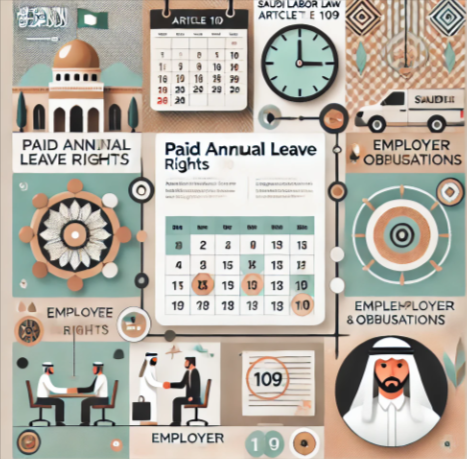This article regulates the worker’s right to paid leave, granting 21 days annually, which can increase to 30 days if the worker has completed five consecutive years of service without interruption. The leave is paid in advance, and the worker is not permitted to waive it or accept monetary compensation instead. The leave must be taken during the year it is due.
Article 109 of the Saudi Labor Law is one of the fundamental pillars of this system, as it organizes the relationship between the employer and the employee regarding overtime hours. Its purpose is to balance workers’ rights with employers’ needs while ensuring proper compensation for additional work.
This article also specifies the rules and conditions to be followed by both parties in cases where either wishes to terminate an open-ended contract. In this article provided by Al-Othman Lawyers and Consultants, we will present an overview of the Saudi Labor Law, the provisions of Article 109, a detailed explanation of it, and the key clauses and their practical applications.
if you want a labor law attorney in Saudi Arabia contact us
Overview of the Saudi Labor Law:
This law was issued on 23/08/1426 AH (corresponding to 27/09/2005 AD) and was published on 25/09/1426 AH (corresponding to 28/10/2005 AD). It is considered one of the most important legislations, as it aims to regulate the relationship between the employer and the employee, achieving balance between the two parties while clarifying their rights and obligations. This ensures the development of the labor market and promotes national economic growth.
The law covers several areas, including:
- Definitions and general provisions
- Organization of employment processes
- Employment of non-Saudis
- Training and qualification
- Labor relations
- Working conditions and terms
- Part-time work
- Protection from workplace hazards, major accidents, and occupational injuries, as well as health and social services
- Employment of women
- Employment of minors
- Maritime employment contracts
- Work in mines and quarries
- Labor inspection
- Labor dispute resolution bodies
- Penalties
- Final provisions
Today, we will focus on Article 109 of the law.
Article 109 Text:
- An employee is entitled to an annual leave of no less than 21 days for each year of service, which increases to a minimum of 30 days if the employee has completed five consecutive years of service with the same employer. The leave is to be paid in advance.
- The employee must take their leave within the year it is due and may not waive it or accept monetary compensation instead of taking it during their service. The employer has the right to determine the dates of the leave according to the requirements of the work or grant it alternately to ensure business continuity. The employer is required to notify the employee of the scheduled leave date with sufficient notice, not less than 30 days.
Objective of Article 109:
Article 109 aims to ensure the employee’s right to receive their official paid leave. It also clarifies the number of days the employee is entitled to annually, which is 21 days. If the employee works for the same employer for five consecutive years without interruption, the entitlement increases to 30 days.
The article further emphasizes that the employee cannot waive their right to leave or exchange it for monetary compensation. This provision within the labor law aims to safeguard the employee’s right to rest and prevent any potential exploitation by the employer.
Read also: Understanding Saudi Labor Law Article 80
What Does Article 109 Cover?
Explanation of the Article:
This article specifies the annual leave entitlements of employees and is one of the fundamental provisions aimed at ensuring employees receive their paid annual leave. It contributes to achieving a balance between work life and personal life, enhancing employees’ productivity and improving their mental health. This article outlines the rights and responsibilities of both employees and employers regarding annual leave.
Key Provisions:
- Annual Leave Duration:
Employees are entitled to 21 days of leave annually, increasing to 30 days if they work for the same employer for five consecutive years. - Leave Eligibility Timing:
Leave must be taken during the year it is due. It can be postponed, in whole or in part, to the following year with the mutual agreement of both the employee and employer. - Leave Scheduling:
Except for official holidays, the employer is responsible for scheduling employees’ leave to ensure the continuity of work. The employer must notify the employee of the scheduled leave at least 30 days in advance. - Leave Waiver:
Employees are prohibited from waiving their leave or exchanging it for monetary compensation. - Leave Postponement:
Employees have the right to postpone their leave, or part of it, to the following year by mutual agreement with the employer, provided the postponement period does not exceed three years.
Read also: Article 107 of the Saudi Labor Law.
What Are the Rights and Duties of the Employee?
Employee Rights:
- Paid Leave:
The employee has the right to receive their full salary during the leave period. - Postponement of Leave:
The employee has the right to postpone their leave with the employer’s agreement, provided the postponement does not exceed three years. - Compensation for Unused Leave:
If the employment contract ends without the employee utilizing their annual leave, they are entitled to monetary compensation for the unused leave. - Increase in Entitled Leave Duration:
The employee may agree with the employer, through the employment contract, to take more than 21 days of leave per year.
Employee Duties:
- Coordination with the Employer:
The employee must coordinate with the employer regarding leave schedules to ensure the continuity of work by notifying the employer within a reasonable time before the leave, except in emergency cases. - Compliance with the Leave Period:
The employee is required to return to work at the designated time after the leave ends. Otherwise, the employer has the right to seek compensation for any resulting losses.
Read also: Understanding Article 77 of the Saudi Labour Law
Special Cases Related to Annual Leave
The Regulations for Leave, issued by the Civil Service Council, outline special cases (to view, click here) such as:
- Leave during the probation period.
- Leave in cases of resignation or contract termination.
- Leave coinciding with official holidays.
Articles 29, 30, 31, and 32 of the Work Regulation specify the provisions related to leave and entitlement. Below, we highlight Articles 30 and 31 for their importance in clarifying the days employees are entitled to paid leave:
Article (30):
The employee is entitled to full-paid leave for official holidays and occasions, as follows:
- Four days for Eid Al-Fitr, starting from the day after the 29th of Ramadan, according to the Umm Al-Qura calendar.
- Four days for Eid Al-Adha, starting from the Day of Arafah.
- One day for the Saudi National Day (23rd September).
If these holidays overlap with the weekly rest days, the employee is compensated with equivalent days either before or after the holidays. However, if the holidays for either Eid overlap with the National Day, no compensation is provided.
Article (31):
The employee is entitled to full-paid leave in the following cases:
- Five days for marriage.
- Three days for the birth of a child.
- Five days for the death of a spouse, parent, or child.
- Four months and ten days if a Muslim female employee’s husband dies, with the right to extend the leave without pay if she is pregnant until she gives birth. She cannot use the remaining leave after delivery.
- Fifteen days for the death of a non-Muslim female employee’s husband.
The right to such leave is subject to the submission of supporting documents for the mentioned cases.
Read also : Saudi Labor Law Article 81: Key Provisions and Dispute Resolution
The Importance of Leave
The significance of leave lies in several aspects:
- Family Aspect:
Leave is crucial for family stability as it provides parents with time to spend with their families. This ensures that children do not feel disconnected from their parents due to prolonged absences, which can significantly impact their mental well-being. - Psychological Aspect:
Leave also holds psychological importance. Employees need rest periods to avoid accumulating work-related stress, which could lead to health issues over time.
Frequently Asked Questions:
Sources:
- The Ministry of Human Resources and Social Development
- Bureau of Experts at the Council of Ministers (Labor Law)
- Leave Regulations from the Ministry of Human Resources and Social Development








